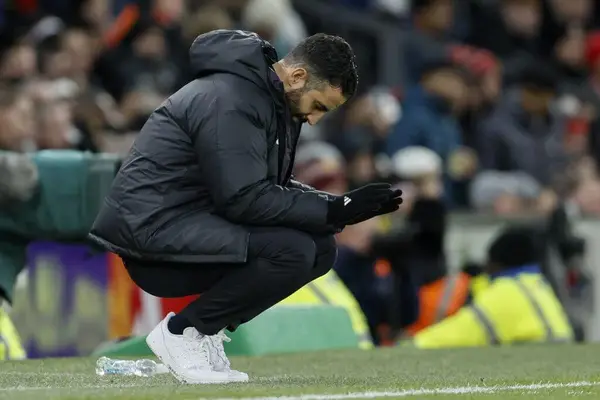Manchester United were always going to lose games this season. But not like this

There is an acceptance this season, more so than in recent years, that this Manchester United side are going to lose games. More than a few, actually.
Not only because that is an obvious conclusion to draw from Ruben Amorim’s debut year as a Premier League manager, with Monday being the anniversary of his first game in charge. His top-flight record since that trip to Ipswich Town now reads played 39, won 12, drawn nine and lost 18.
But also because if a realistic aspiration for this season is to return to some form of European competition, if not the Champions League, then that would mean merely a modest league finish — say sixth, seventh or eighth — and that in turn would mean plenty of bumps in the road.
Even after another summer of transfer spending north of £200million, expectations are low — lower than they have been in a long time.
But they cannot lose like this.
Monday’s 1-0 home defeat by David Moyes’ 10-man Everton was a bad result. The insipid performance was worse. Remarkably, it was United’s first defeat at Old Trafford in the Premier League era after seeing an opposition player sent off.
Even more remarkably, the player in question was shown an early red card for striking his own team-mate. Idrissa Gueye had to be practically dragged off the pitch after swiping at Michael Keane’s face and seemingly ruined the visitors’ chances of earning a result. But from United’s perspective, this was no happy slap.
Rather than putting their depleted and squabbling opponents to the sword over the 77 minutes-plus that followed, United were second-best throughout. They had been before Gueye’s dismissal, too. So desperate was United’s display, Amorim ended the night asking for his players to show the same fight as Gueye did.
“I don’t agree with that sending off. We can fight with team-mates,” he said. “I know it’s violent conduct, the referee can agree with that, but I hope my players, when they lose the ball, they fight each other. They cannot be sent off, but my players show (in) many games that we can do it. Today, we didn’t,” he said in his post-match press conference.
United were more dominant and enjoyed longer spells of possession inside Everton’s half after the break, when the game more closely resembled what you would expect from an 11-v-10 contest. But damningly, in some ways, this state of play seemed to only make Amorim’s players more uncomfortable. The extra space available around Everton’s penalty area, the extra second they had to find a telling pass, only drew more attention to how incapable they were of picking the lock and cancelling out Kiernan Dewsbury-Hall’s ultimately decisive opener.
For the sixth time this season, United failed to win while bossing possession. A total of 38 crosses was their most this term by a distance, at times grimly reminiscent of the infamous 81 United played in a 2-2 draw with Fulham here in February 2014 — a day that came to define Moyes’ doomed reign.
Amorim will be fairly criticised for not altering his system against 10 men, instead sticking with his three centre-backs. But it will be the first sustained, substantial criticism his 3-4-3 shape has had for weeks. He complains that it is picked apart when United lose, but ignored when results improve. And on that, he has a point.
For his part, Amorim diagnosed United’s problem as a lack of intensity. The absences of Matheus Cunha and Benjamin Sesko — and the latter’s ability to connect with all those crosses — did not help. Joshua Zirkzee was willing on his first club start in 225 days, but unable to stake a convincing claim for further opportunities any time soon.
Much was made of Amorim including Shea Lacey, one of the most highly-regarded talents to come through United’s academy system in recent years, in a matchday squad for the first time. Lacey got a place on the bench but stayed there. United’s final changes were in the 58th minute.
Amorim could reasonably argue that it was not the type of situation where you would want to throw on an untested 18-year-old, and that Lacey’s time will come, possibly when United’s Africa Cup of Nations contingent departs next month. And yet there is an irony that Everton started two Carrington graduates of their own in Keane and James Garner who, between them, clocked up more Premier League minutes in one night than Amorim has given to United academy-raised talents all season.
Playing the kids would not be a silver bullet, far from it, but demonstrating a commitment to upholding valued principles and traditions can help insulate a manager from criticism that little bit more, especially when one bad result turns a five-game unbeaten run into a three-game winless streak.




